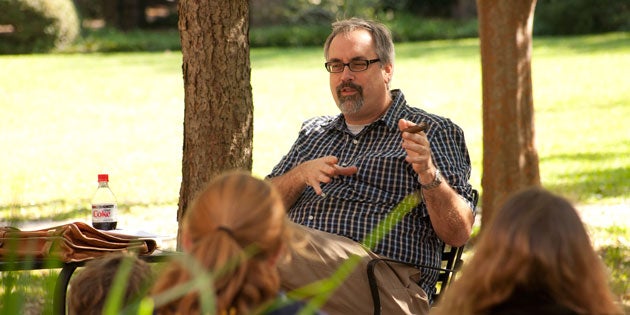The great American poet William Carlos Williams didn’t understand how someone could live and never write something down, says Bret Lott, acclaimed novelist and professor of English at the College of Charleston. If you’re a like-minded person, perhaps it’s time to consider applying to earn a Master of Fine Arts degree in Creative Writing from the College.
The two-year, full-residency program, which begins in the fall of 2016 pending approval from the Southern Association of Colleges and Schools Commission on Schools, is designed to sharpen the writing skills of graduate students interested in fiction and poetry. Students will choose from two tracks of instruction: either a studio track designed to prime writers for publication and careers in literary-related fields, or an arts management track to prepare students for “positions in the arts community at large,” says Lott, the program’s director. Altogether the program promises immersion in a world of prose, poetry and the practical aspects of establishing a career in the arts.
Lott is the author of the bestselling novel Jewel and 13 other titles. His teaching colleagues in the MFA program, including poetry professors Emily Rosko and Gary Jackson as well as fiction writer Anthony Varallo, are equally as talented. Together they’ve published more than 20 books.
These professors will teach regular three-hour writing workshops in which students offer critiques of each other’s work. Also, the MFA program will feature graduate courses in English and American Literature as well as Elements of Form and Craft in Fiction. Enrollment will be capped at 24 students for the College’s MFA program, and classes will meet in a historic home at 72 George St.
 Students earning an MFA at the College will also have the chance to help produce Crazyhorse, one of the nation’s leading literary journals, which has been housed at the College since 2001.
Students earning an MFA at the College will also have the chance to help produce Crazyhorse, one of the nation’s leading literary journals, which has been housed at the College since 2001.
Lott says the College’s MFA program provides aspiring professional writers “time to rehearse” and practice a craft that is almost unmatched in its utility and versatility.
“Writing is such a portable thing,” says Lott. “You can go anywhere and be a writer.”
Besides, he says, “It’s great for you as a human being to practice art, to be creating things, making things.”
And that’s a sentiment with which the poet Williams would surely agree.





